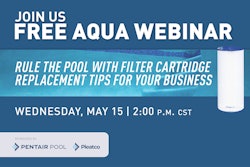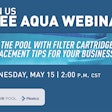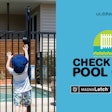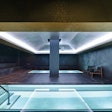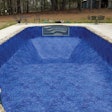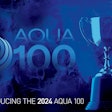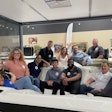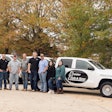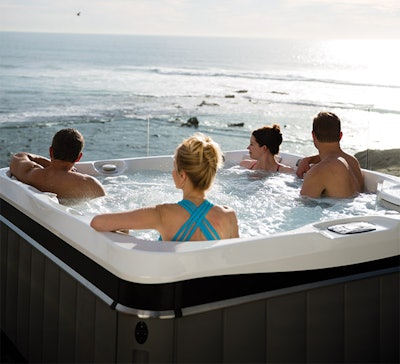
The portable hot tub industry is in the midst of a makeover. Long viewed as selling products centered around socializing or relaxing with friends and family, many manufacturers and dealers are tweaking their sales and marketing to include stronger messaging around health and wellness. One manufacturer believes so strongly in the health and wellness angle that it's coalescing an entire company culture around it.
Watkins Manufacturing, the Vista, Calif.-based maker of Hot Spring Spas, changed its name to Watkins Wellness earlier this year, and added a new tagline: "Feel Good. Live Well."
Scott Iverson, director of sales training for Watkins Wellness, credits Steve Hammock, president, and Mike Dunn, executive vice president, with the idea, which was several years in the making.
"Steve has a great line about it," Iverson says. "He says, 'These are not home-improvement products. These are self-improvement products.' And that's really the whole point. We want people to see hot tubs as necessities for living well."
Iverson's job as director of sales training for Watkins Wellness puts him on the front line in the company's effort to rebrand itself as a supplier of products that deliver health as much as they do happiness.
"I think most people still think of hot tubs as a luxury item, or an item that you put in your backyard to have a great time with your friends and family," he says. "But people are coming to understand that it's capable of so much more. What people have become acutely aware of is that they're getting older, and that has them looking for ways to live better. They're learning what water — and especially hot water — is capable of. It's pretty incredible."
One of Watkins' top dealers, Seattle's Olympic Hot Tub, is fully on board with the company's new focus. In fact, former owner Alice Cunningham, who recently passed the torch to enjoy semi-retirement, says she and husband Blair Osborn have been selling health and wellness for years. (To read more about Alice and Blair's history in the hot tub industry, turn to page 61.)
Cunningham, who had been writing a blog since July 2008 (!), says she had an epiphany one day and decided to start selling "wellness" instead of "relaxation" after seeing spikes in feedback when she wrote pieces centered around health and wellbeing. The decision has been validated over and over, including recently when she took a trip to a health spa in Tecate, Mexico.
"Rancho La Puerta is a beautiful place you can go for a week and do all the exercise you want, or just hang out by the pool," she says. "The last time I went there I met these three girls. They were like, 35, 36 years old, from D.C., with really big jobs that they work hard at. So this was their big reward, to come to the spa for a week. Well, on the third night they told me they were leaving. 'You're leaving?!' They said, 'We don't want to relax.' They were just afraid of losing their edge! Now, that's just sad.
"I think a lot of people feel that way because the world can be so hard today. You're constantly trying to keep up with everything, and you feel like you can never just relax."
These go-getters might not be able to "relax," she realized, but they were eating organic, shopping at Whole Foods, taking good care of their bodies. Why not sell that?
"That's precisely what we're selling," she says. "Selling 'relaxation' just isn't going to work for the people we want to reach. So we sell health. And we've been doing it for a long, long time."
Selling Science
The selling points Iverson, Cunningham and countless other converts in the industry tout fall under the category of "soft benefits" in that they don't make specific claims. You won't hear them tell an arthritis sufferer, for example, that a hot tub will cure their condition. That does not mean, however, that there isn't hard science behind the benefits they sell.
Both Iverson and Cunningham are devotees of Dr. Bruce Becker, a physiatrist, researcher and author with a lifelong interest in aquatic therapy. Between 2005 and 2008, he received just under $2 million in grants from the National Swimming Pool Foundation to research the effects water had on the body.
"Bruce Becker is a hero of mine," Iverson says. "To my knowledge he was really the first to put some real numbers behind the soft benefits we've always talked about.
"His pursuit is simply to discover why we say, 'aaah' in hot water," he says with a laugh. "His great quote is that the body is intuitive, and that the body knows what's good for it."
According to Becker, his interest in hot tubs as rehabilitation and wellness products started years ago while working to rehab Olympic athletes. He was so impressed with the dramatic results he started using aquatic therapy with his other, non-Olympian rehab patients.
"Once I saw that and started to move forward, I wrote about it, talked about it across the country with therapists and physicians and worked to try to revive the whole aquatic therapy field," Dr. Becker says. "It was used extensively in the '20s, '30s and '40s, before polio was cured. But after that, therapists stopped being trained in the principles of aquatics and people kind of forgot what it could do."
Initial research focused on drilling down into something that was commonly recognized but poorly understood. Becker uses a commuter driving home through snarled traffic "after a bitch of a day," when it can feel like the world is falling apart.
"Once you get home, take off your clothes and get into the hot tub, you kind of go, 'aaah' and everything around you starts to feel better. Our metathesis for the research was to understand just what the hell that 'aaah' was all about. It's so ubiquitous there had to be some level of physiological changed involved."
Turns out he was right. Becker and his team discovered immersion in water lowered blood pressure, helped strengthen respiratory muscles, increased blood flow to muscles and joints, promoted relaxation and may even improve sleep patterns (see sidebar, "Physiologic Effects of Immersion," for a further listing).
These discoveries have met with enthusiasm from Watkins Wellness dealers, whom Iverson says have been taking hot tubbing more seriously than ever.
"What I'm seeing is that the more our dealers use their own hot tubs, the more they become ambassadors for what they can do," he says. "They know that the benefits of hot water immersion are cumulative. In other words, the more you soak the better you feel. As a result of that I think those dealers have been piqued to read more about Dr. Becker and what his studies have shown.
"Where else can you escape 90 percent of the earth's gravity? You cannot do that anywhere else on the planet except for in water. And just think about what that does to your joints and muscles and your whole skeletal structure."
Iverson cautions that even customers who come in looking for the soothing and recuperative powers a hot tub delivers can drift once they start getting acquainted with the product and its options.
"The unfortunate thing is that when people shop they don't shop based on a why, they shop based on a what," Iverson says. "They do want to get a hot tub to help their back feel better, for example, but once they start looking around it's, 'How many of these?' and, 'What horsepower is that?' That's always going to happen. But bringing the focus back to thewhy of health benefits helps customers really justify the purchase and even adds urgency to their decision."
Healthy Start
One manufacturer, whose name among some hot tub shoppers is synonymous with the category, didn't need much convincing that health and wellness were good sales messages to spread. That narrative is baked into Jacuzzi's origin story.
The Jacuzzi brothers came from Italy in the early part of the twentieth century. They were serial entrepreneurs, working in aviation and agriculture, developing a pump for watering orchards, for which they won an award in 1930. Eventually they settled in Northern California and opened a store called Jacuzzi Bros. up in Richmond.
That's where Martin Borsanyi, senior director of marketing for Jacuzzi Brand Hot Tubs, picks up the story.
"In the 1950s one of the sons, Ken, was diagnosed with child rheumatoid arthritis," he says. "His mother would take him around to hospitals and they discovered he got great relief in the hydrotherapy pools. So she asked the boy's father, Candido Jacuzzi, to come up with something so their child could find relief at home."
That product, a pump outfitted to deliver hydrotherapy in a bathtub, would eventually become the J-300 hydrotherapy pump.
While Borsanyi is proud of the company's beginnings, he's quick to point out that the type of hydrotherapy the young Ken Jacuzzi received is now available from a number of modern manufacturers.
"There's really a tremendous opportunity for the category," he says. "The percentage of people who have the money and the backyard to own a hot tub and who actually do own one is relatively small. At the same time, awareness of the breadth of benefits of hydrotherapy is limited. To most people, sitting in a hot tub is just relaxation, or stress relief. So marketing the known and proven health benefits to hydrotherapy presents a real opportunity to grow the category."
Jacuzzi Brand uses its website, jacuzzi.com, to tout the benefits of hot water immersion and the healing power of jetted water. There, potential customers can watch videos touting its most recent models, and watch a clip about the company's history, which includes an interview with Ken, now in his mid-70s.
"The video is a highly impactful piece, because it is Ken Jacuzzi speaking first hand to his own personal experience and pain related to rheumatoid arthritis," Borsanyi says. "He knows what hydrotherapy can do. When he was diagnosed, doctors told his parents he wasn't going to live to be 3 years old, but look at him now. That's a powerful message about hydrotherapy."
Active Recovery
Joe Stone owns a chain of three Swim Fitness retail locations in Northern California that sell Master Spas out of Fort Wayne, Ind. He's a long-time industry observer who chaired the Hot Tub Council for five years back when APSP was called NSPI. His stores deal in both portable hot tubs and swim spas, the latter making up the majority of sales.
During his 45 years in the industry he's seen the focus go from the party appliance with an accent on the social aspect of hot tubbing, to today's increasing emphasis on health, pain relief, recuperation and the like.
"I have people walk into my store with arthritis, fibromyalgia, severe back pain or just chronic pain," he says. "Aquatic therapy really unleashes the opportunity to improve your quality of life through the exercise and therapy you get in the water from its buoyancy. A swim spa offers enough depth of water that you can do pretty much whatever you want to do."
Master's swim spas, which have a big-time celebrity endorser in U.S. Olympic swimmer Michael Phelps, include a complement of exercise equipment such as Pilates bands, water bells and ankle fins all designed to increase resistance in the water.
"My greatest reward in selling swim spas or portable hot tubs to customers is to literally see people's transformations right in front of me," he says. "I'll have people walk into my stores with a handicap or ailment who are obviously struggling on land. Maybe it's a new knee or even a missing limb. Put them in the water and they're back to normal. Their facial expressions change, and again, there is no greater reward."
Stone gives a nod to Dr. Becker's work, but also credits another researcher, Dr. Rick McAvoy, for his groundbreaking work in aquatic therapy.
"He spends a lot of time talking about the reduction of stress," Stone says. "Certainly aquatic therapy is going to make your heart more healthy, so the cardio benefits are there, you can eliminate cholesterol through exercise, and people can use it to get their weight under control, too."
Stone promotes these and other benefits through parking lot and tent sales at his Bay-area stores, at malls and anywhere else he thinks potential customers (an aging group, in his eyes) can be lured.
"We recently did a fundraising event at a shopping mall and we hired some girls that swim for the Special Olympics to raise money for local police departments," he says. "And there's another group that takes care of dogs wounded in combat. And guess what? Their therapy is aquatic! So we had the girls and the dog all there, raising awareness about the benefits of swim spas."
Don't Stop Selling The Sizzle
While hot tub manufacturers and dealers have made inroads into the health market, all the professionals we spoke with stressed that they are not advocating hawking health, wellness, and rehabilitation at the expense of more-traditional selling points.
"By far, the number one reason people say they are interested in a hot tub is still relaxation," Borsanyi says. "And for some people, the word 'therapy' can have a negative connotation, as if you're asking them to take their medicine. At the same, it's important to educate consumers on the real therapeutic benefits of a hot tub. So it's a balance."
The salespeople at Olympic Hot Tub are similarly averse to pushing the curative or medicinal side of the product right away.
"When people come in it's just not good to say, 'Do you have any health issues?' or, 'It looks like you're having a hard time walking,'" Cunningham explains.
At the same time, people with chronic fatigue, insomnia, diabetes or recent joint replacements aren't going to come in and tell you about it right away, either. Cunningham chalks it up to a reluctance to show weakness and admit you've got any issues among her prospective customers. Good salespeople, she says, can ferret out what a customer's issues might be and take conversation there at the appropriate time.
In other words, you can sell health, wellness and rehabilitation but you don't have to lead with the "arthritis."
Physiologic Effects of ImmersionThe hard science behind the hot tub's soft benefits Sitting in a tub of water feels good. It's relaxing, relieves stress and helps ease muscle and joint pain. These benefits sound like common sense, but they also have a lot of scientific backing. A dealer would be wise to have at least a passing familiarity with these concepts. Following is a list of some proven benefits, and others that scientists strongly suspect are benefits, pending further research. Cardiac Respiratory Muscle and Bone Kidney Neurologic Source: Dr. Bruce Becker |
Hot Tub Gallup Survey SlatedAPSP to poll consumers on hot tubs A year after its landmark survey of pool owners and non-owners, APSP is gearing up for a second round of research, this time on portable hot tubs. "We're teaming up with Gallup again and doing the survey to understand the purchase drivers behind hot tubs," says Rich Gottwald, APSP president and CEO. "They'll poll around 1,000 people who have bought one in the last four years, and another 2,000 who have not, but who fall into the demo. We'll be trying to understand what led to either of those decisions, and we'll take a look at what kinds of things they're thinking about when they go to make a purchase, as well." One thing Gottwald says he's curious to learn about from the survey is how much of a factor health and wellness plays into people's buying decisions. "We do see a lot of manufacturers these days promote the product from the health angle," he says. "This would either confirm that that's important to people, or maybe it'll give us other ideas about how they could be positioning their products." Currently, the project is in development, with an expected launch in the fall and results available around the first of December. "It's quite an expensive program and we are gathering the companies who are going to participate, and they will self-fund it as a group," Gottwald explains. "Then, the survey results will go only to those companies." As was the case with the pool survey a year ago, non-participating companies will have a chance to buy the results later. Companies that get in on the ground floor, though, will be able to work with Gallup to frame the survey instruments. "This is something we need to do more of, so we can better understand consumer behavior and help our members more effectively reach people. So we did it with pools, we're doing it with hot tubs and we'll continue to look at other ways to provide that research." |























